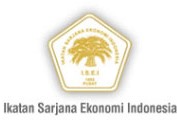The Internet Costs’ Role in Indonesia's Creative Industry Competitiveness
(1) Universitas Airlangga
Abstract
The purpose of this study is to analyze the role of the Internet as a soft infrastructure medium in the framework of international trade facilitation. as part of international trade facilitation which is expected to be able to reduce barriers in Indonesia's trade with 18 trading partners in the export of creative industry goods by HS codes: 49, 91, 92, 95 and 97. The analysis method used is a quantitative approach with panel data regression using a gravity model based on time series data with cross sections of 18 trading partners from 2008 to 2017. The results of the analysis show that the internet subscription price variable has a significant effect on increasing international trade. Other variables such as GDP, population, and distance have a significant positive or negative effect on international trade, while FTA does not have any effect on exports of creative industry goods.
Keywords
Full Text:
PDFReferences
Aisyah, R., Prihantono, G. & Madyan, M. (2021). The Effect Of Tam In An Online Shopping Context. Review Of International Geographical Education Online, 11(4). doi: 10.33403/rigeo.800656.
Aryani, Y., Andari, W., & Suhindarto, S. (2020). The Influence Of Information Technology And E-Commerce On Indonesian Trade To ASEAN Countries. Indonesian Journal Of Economics, 9(1), 53–66. https://doi.org/10.52813/jei.v9i1.30
Carbaugh. (2015). International economics (9th ed.). South-Western.
Baldwin, & Richard. (1989). Sunk Cost Hysteresis. National Bureau of Economic Research, (2911)
Barry, & Pakasa. (2015). The Time-Varying Impact Of Regional Trade Agreement: Evidence from ASEAN. Asian Economic And Financial Review, 5(9), 1061.
Bekraf, & BPS. (2016). Export Creative Economy 2010-2016. Petratama Persada.
Bernard, A., & Jensen J. (2004). Why Some Firms Export. The Review of Economics And Statistics: National Bureau Of Economic Research.
Bauböck, & Rainer. (2007). Why European Citizenship? Normative Approaches To Supranational Union. Theoretical Inquiries in Law. Berkeley Electronic Press, 8(2), 452-488.
Bhagwati, J., & Panagariya, A. (1996). The Theory Of Preferential Trade Agreements: Historical Evolution And Current Trends. The American Economic Review, 86(2), 82-87.
Campa, J., & Manuel. (2004). Exchange Rates And Trade: How Important Is Hysteresis In Trade?. European Economic Review: Science Direct.
Clarke, (2008). Has The Internet Increased Exports For Firms From Low And Middle-Income Countries? Information Economics And Policy, 20(1), 16–37. https://doi.org/10.1016/j.infoecopol.2007.06.006
Mian, D., Yotov, Y., & Zylkin, T. (2014). On The Trade Diversion Effects Of Free Trade Agreements. Economics Letters, 122(2), 321-325.
Das, S., Roberts, M., & Tybout, J. (2007). Market Entry Cost, Producer Heterogeneity, And Export Dynamics. Econometrica: Wiley Online Library, 75(3), 837-873.
Dornbusch, Rudriger, Fischer, S., & Statz, R. (1994). Macroeconomic [Makroekonomi]. Jakarta: Media Global Education [Jakarta: Media Global Edukasi].
Egger, P., Larch, M., Staub, K., & Winkelmann, R. (2011). The Trade Effects Of Endogenous Preferential Trade Agreements. American Economic Journal: Economic Policy, 3(3), 113-43.
Freund, C., & Weinhold, D. (2004). The Effect Of The Internet On International Trade. Journal Of International Economics, 62(1), 171–189. https://doi.org/10.1016/S0022-1996(03)00059-X
Freund, C., & Weinhold, D. (2000). On The Effect Of The Internet On International Trade. International Finance Discussion Papers, (693). https://EconPapers.repec.org/RePEc:fip:fedgif:693
Freund, C., & Weinhold, D. (2002). The Internet And International Trade In Services. American Economic Review, 92(2), 236–240. https://doi.org/10.1257/000282802320189320
Gnangnon, S. (2021). Effect Of Poverty On Financial Development: Does Trade Openness Matter?. Quarterly Review Of Economics And Finance, 82, 97–112. doi: 10.1016/j.qref.2021.08.002.
He, Y., Li, J., & Jiang, J. (2011). Impact Of E-Commerce On International Trade. Based On An Iceberg Cost Model. International Journal Of Trade, Economics, And Finance, 2(3).
Hinson, E. & Adjasi. (2009). The Internet An Export: Some Cross Country Evidence Selected African Country. Journal Of Internet Commerce: Routledge Taylor & Francis Group.
Hyman, D. (1993). Modern Microeconomics Analysis and Application, 3rd edition. Boston: Irwin.
Ibrahim, Ika, M., & Ari, W. (2010). The Impact Of ACFTA Implementation On Indonesia's International Trade [Dampak Pelaksanaan ACFTA Terhadap Perdagangan Internasional Indonesia]. Monetary Economics And Banking Bulletin [Buletin Ekonomi Moneter Dan Perbankan].
Koo, W., Kennedy, P., & Skripnitchenko, A. (2006). Regional Preferential Trade Agreements: Trade Creation And Diversion Effects. Review Of Agricultural Economics, 28(3), 408-415.
Obstfeld, K., & Melitz, M. (2011). International Economics : Theory & Policy. Pearson Education.
Lipczynski, J., Wilson, J., & Goddard, J. (2005). Industrial Organization Competition, Strategy, And Policy, 2nd Edition. Harlow: Prentice Hall.
Mankiw, & Gregory N. (2004). Principles Of Macroeconomics, 3rd Edition. New York: South-Western.
Machado, P., & Trigg, A. (2021). On Absolute And Comparative Advantage In International Trade: A Pasinetti Pure Labour Approach. Structural Change And Economic Dynamics, 59, 375–383. doi: 10.1016/j.strueco.2021.09.005.
Mandelman, F., Waddle, A. (2020). Intellectual Property, Tariffs, And International Trade Dynamics. Journal Of Monetary Economics, 109, 86–103. doi: 10.1016/j.jmoneco.2019.10.013.
Portugal-Perez, A., & Wilson, J. (2012). Export Performance And Trade Facilitation Reform: Hard And Soft Infrastructure. World Development, 40(7), 1295–1307. https://doi.org/10.1016/j.worlddev.2011.12.002
Roberts, M., & Tybout J. (1997). The Decision To Export In Columbia: An Empirical Model Of Entry With Sunk Cost. American Economic Review: JSTOR.
Soelistyo. (2004). International Economic 1 [Ekonomi Internasional 1]. The Open University Publishing Center [Pusat Penerbitan Universias Terbuka].
Suranovic, S. (2010). International Trade : Theory And Policy. Flat World Knowledge, Inc.
Vemurri, V., & Siddiqi. (2009). Impact Of Commercialization Of The Internet On International Trade: A Panel Study Using The Extended Gravity Model. The International Trade Journal: Routledge Taylor & Francis Group (Online) World Bank, Several Series.
Yang, S. & Inmaculada M. (2014). A Panel Data Analysis Of Trade Creation And Trade Diversion Effects: The Case Of ASEAN-China Free Trade Area. China Economic Review, 29, 138-151.
Refbacks
- There are currently no refbacks.

This work is licensed under a Creative Commons Attribution 4.0 International License.






